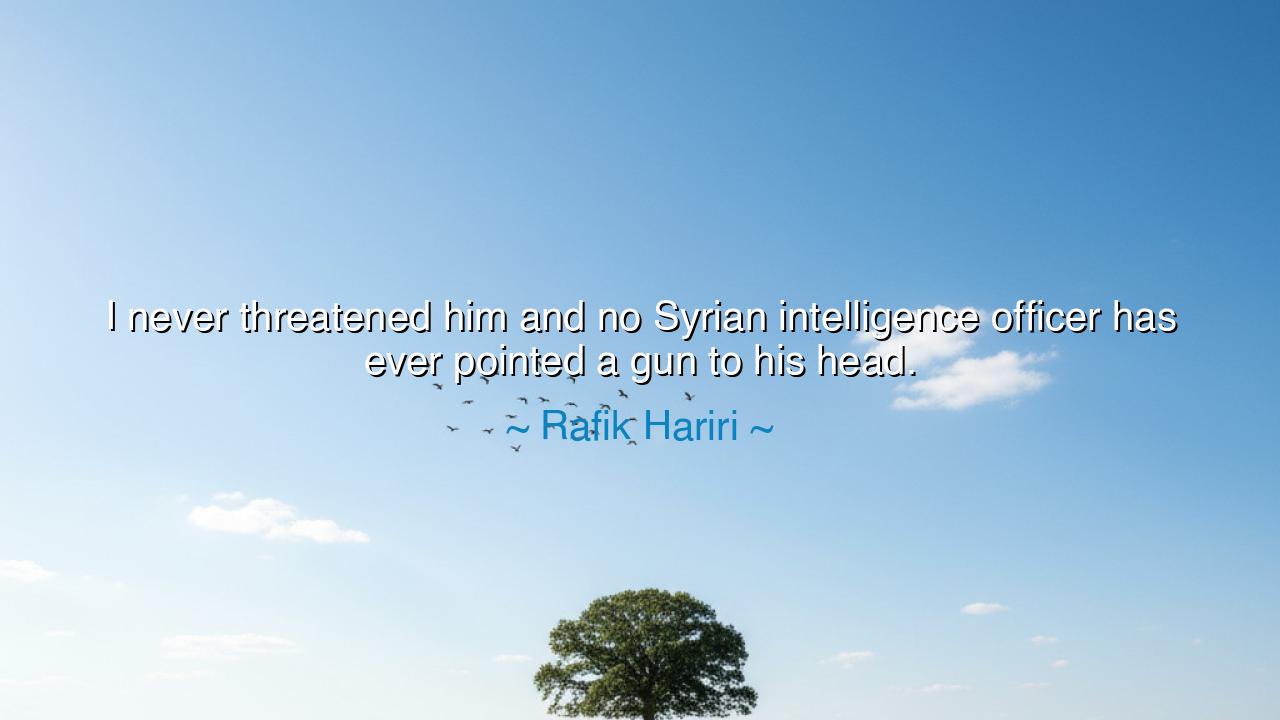
I never threatened him and no Syrian intelligence officer has
I never threatened him and no Syrian intelligence officer has ever pointed a gun to his head.






“I never threatened him and no Syrian intelligence officer has ever pointed a gun to his head.” – Rafik Hariri
In these solemn and charged words, Rafik Hariri, the former Prime Minister of Lebanon, speaks not merely as a statesman defending his honor, but as a man standing at the crossroads of truth and history. His declaration carries the weight of an era steeped in political tension, foreign influence, and the struggle for national sovereignty. When Hariri proclaimed, “I never threatened him and no Syrian intelligence officer has ever pointed a gun to his head,” he was not only denying an accusation — he was asserting the moral high ground in a time when shadows ruled the corridors of power. His words are both an act of defiance and an appeal to justice, echoing the ancient cry that truth needs no weapon but itself.
The origin of this quote lies in the turbulent political landscape of early 21st-century Lebanon, a nation still haunted by the presence of Syrian forces and intelligence networks that had exerted immense control for decades. Hariri, who had long balanced the delicate relationship between Lebanon and Syria, found himself caught between loyalty to his people and the dominance of a neighboring power. The quote was his response to claims and rumors that coercion or threat had been used in the complex web of Lebanese politics — that his hand had been forced, that fear, not freedom, guided decisions of state. By speaking these words, Hariri sought to make clear that his will was his own, and that no Syrian officer — no man, however powerful — could claim dominion over his conscience.
But beneath the surface of politics lies a deeper truth, one that echoes through the ages: the power of integrity in the face of fear. Hariri’s statement is, in essence, a testimony to the ancient virtue of honor — the belief that the true measure of a leader is not in his alliances or his might, but in the purity of his intent. To say “I never threatened him” is to affirm a kind of inner sovereignty, a refusal to wield power through intimidation or deceit. To say “no gun was pointed to his head” is to reject the politics of fear that so often corrupts nations and men. In these words, we hear the echo of statesmen past — those who knew that leadership without moral strength is tyranny in disguise.
Consider the story of Marcus Tullius Cicero, the Roman orator who, like Hariri, stood against the rising tide of corruption and oppression in his time. Cicero faced those who ruled through fear — men who believed that the sword could silence truth. Yet he spoke boldly in defense of the Republic, declaring that “the welfare of the people is the highest law.” Like Hariri, he too faced betrayal and death, yet his voice outlived his enemies. For truth, once spoken, does not die with the man who speaks it. Hariri’s own assassination in 2005, which shook Lebanon and the world, only magnified the meaning of his words. It showed that while guns may end lives, they cannot extinguish the moral light of a man who refused to yield to terror.
In the style of the ancients, we may say that Hariri’s words are not merely political — they are symbolic of the eternal struggle between justice and power. Every age knows its tyrants, and every tyrant knows the temptation of control through fear. But the wise have always known that fear is a weapon that wounds both the wielder and the victim. The greatest rulers — from Ashoka to Mandela — have understood that true authority arises from respect, not coercion, from persuasion, not domination. Hariri’s words belong to that lineage of wisdom: a reminder that nations, like men, cannot be truly free until they reject the rule of fear.
Yet, these words also carry sorrow — for they reveal how fragile truth becomes in the presence of power. When Hariri spoke them, Lebanon stood on the edge of a precipice, torn between liberation and submission. His defense was not only for himself, but for the soul of his country. He sought to affirm that dignity cannot coexist with intimidation, and that the path to peace cannot be paved with threats. To live and lead without resorting to fear is a rare courage, one born of faith in humanity’s higher nature.
So let this teaching be passed down: Power without conscience is destruction, but courage guided by truth is eternal. Let no man or woman seek victory through fear, nor submit to those who rule by it. For the tyrant’s authority ends with the fall of his shadow, but the integrity of the just endures beyond the grave. As Rafik Hariri’s own life testifies, it is not the gun that secures peace, but the strength of the heart, the will to stand for what is right even when surrounded by peril. Therefore, in your own life, when you are tempted to wield fear or surrender to it, remember this: true power is moral power, and truth — though unarmed — is the only force that can stand against the darkness and remain unbroken.






AAdministratorAdministrator
Welcome, honored guests. Please leave a comment, we will respond soon